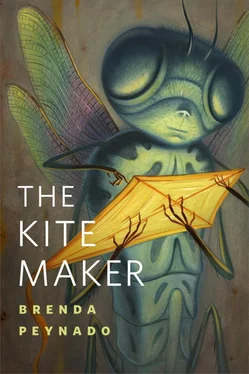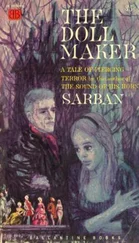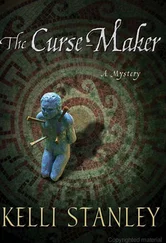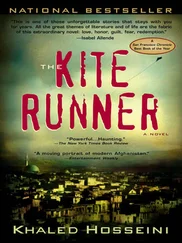Brenda Peynado
THE KITE MAKER
You’ve never seen a kite fly until you’ve seen an alien fly one. Dragonfly wings on their backs trembling with anticipation, these deep sighs from their purple mouths as they’re unrolling the spool. They run with their slow, spindly legs to let the kite pick up speed. When the diamond of cloth is let loose from their skeletal hands, you can see their armored shoulders strain to rise up with it. As the diamond dips and rises on the string, you can hear these great yips, then these wavering trills and the desperateness of their song, how they want to be up there. There were thousands of them at the park the other day, and I swear to god I cried hearing those songs ripped from thousands of alien throats.
A few of them try to hide this surge of emotion when I put the kite in their hands. Tove was like this. First time he came into my shop, he tried to keep his eyes closed, his black eyelids flickering with the effort. He walked in pretty stiff for his kind, pushing his skinny feeler legs barely out in front of him, like he was sneaking in on tiptoe. But the little hairs on those legs bristled, and finally, he flicked open his black lids.
Can I help you? I asked. I never knew what to say around them. It seemed like everything I said was wrong, loaded with some hidden meaning I didn’t intend. I still remembered the moment they first arrived, their spaceships burning through the atmosphere like comets, like falling angels, and how we’d surrounded the ships in horror, aiming for their thin legs with anything we could find, because the rest of their bodies were armored but the legs snapped like pencils. I had done these things myself, when the boys were small, out of fear, but there was no taking it back now. The ease of killing was just so natural to us from when bugs had encroached on the territories of our houses. Now the aliens kept my shop afloat, seeing as they were the only ones who wanted the antique toys I dealt in. These days all the humans wanted were tech-gadgets, anything with the hint of looking alien, a taste of the exotic. Kids weren’t even flying remote helicopters anymore, not even drones. Now you could roll into a suburb and the kids in the front yards would be flying around mini Dragonfly Arks, playing at intergalactic war, the losers crashing down into the home base dirt patch they called Earth. Kites, spinning tops, these were ancient toys for kids these days, more alien even than the Dragonfly tech we’d dragged out from the ships before the aliens could start fighting back. Teenagers were covered in Dragonfly tattoos and alien symbols.
Tove inhaled sharply, his Dragonfly body puffing up for a moment. He looked around my dusty shelves of wooden and metal toys. Miniature trains, yo-yos, weathervanes, carved boxes, maracas, tin soldiers. The pegged wall of kites, bright and colorful like those old collector’s rooms of dead butterflies stretched open to display their wings—this was the only wall he didn’t look at, as if he was infinitely aware of where it was.
I am Tove Who Battles Photons, he said in the strange way they always announced themselves, his voice flickering in and out of human range.
Anything you need? I said.
He said, A wooden top. Maybe a kite? Or a game of the dominos?
I used to be able to scalp them for all the technology they could spare just for the kites. Since, they’d learned to feign nonchalance, but a good antique dealer knows the market. I led him straight to the kite wall, the sailcloth breathing with the breeze he’d let in.
Tove scanned the price tags and shook his head. Maybe not, he said in that gravely voice.
I knew what they did for money. Because their wings and legs were built for gravity and atmosphere thinner than ours, they didn’t move fast, couldn’t fly, were unsuitable for heavy lifting. Jobs like construction and fieldwork were reserved for humans. But their hands, their fingers were so nimble, so thin and skeletal they swished through our atmosphere like singing blades. Needlework, precision jobs, diamond cutting. They would do all of this for less money than our most meaningless jobs. They slept in giant warehouses that companies had built for this purpose. But everything they made felt strange, built for another world. Cloth rasped in a way that felt hollow to our ears, jewelry they’d cut reminded us of scales instead of gold. Alien-made. All the brawny, tough-man jobs were sources of human pride, if you could have them. In this way, I was more like the Dragonflies than the humans, my craft something that had become disgusting to most people, a sign of weakness.
I heard people passing on the sidewalk outside. I held my breath. Sometimes I got a hard time from angry groups who still weren’t pleased that the aliens had landed, no matter how many of us were won over, no matter that there was no decent way to get rid of them. A group of anti-miscegenation skinheads had been roving the strip, and it would be the first time they came in my store. I’d had bricks thrown through my window a few months before.
But the footsteps passed.
Next time, I said to Tove, exhaling.
It wasn’t about the money. It was about pride in something I’d done, about art. I’d made each kite with my own hands, thread and needle, stick and lathe. I dyed the cloth myself into tapestries that could be seen from the ground. It wasn’t that they couldn’t make their own kites or that there weren’t a few other holdout kite makers. The Dragonflies sometimes made them out of paper bags and twigs. Sometimes they even made them out of scraps of nylon they’d quilted together, stolen from the factories where they worked. But the alien craft makers reflected their own predicament in everything they made. These clunky, makeshift things flew poorly; they only reminded people of how stuck we were on the ground by their gracelessness. Mine were art, the aliens told me, they were more than the sum of their parts. Mine had the lift, the weightlessness that made you feel like you could rise up there with them the kind that dragged your heart up by their string. They told me it made them feel like they were back home, like they had never been stuck here, like thousands of their own kind were still family-swarming around their sun. Dragonflies dropped in my store often, like moths to light. Profits went up. Now, I could make the kites as big as I wanted. I had one as big as a hang glider in the backroom. Eight hands would have to hold it at once to keep it on the ground.
I went to return the kite from his hands to a wooden peg on the pegboard wall. I brushed his feeler hands as I did, the millions of hairs on his black fingers tickling me. I felt my face go hot. I knew I’d done something wrong instantly.
Tove withdrew his thin arm as if he’d been burned and said nothing. He left the store in the same tiptoeing way he came.
* * *
I went home to my human-made house in the suburbs. In the dusk, I always half-expected another ark to fall, the parabolas of broken ships littering the sky. But it had been fifteen years since they arrived, more since they first headed for earth, their home world eaten by a red giant sun, only enough fuel and years to reach the closest habitable planet, break their ships open like eggs in the atmosphere, and never return. Now, when I rolled into my driveway, the kids roamed the neighborhood playing humans and aliens, hitting each other with electronic wands that dissipated on contact so that no damage could be done. We didn’t have any aliens on our side of town; the children considered weak played the aliens, eyes big, offering no resistance. If they fought back, they were scolded, That’s not how it happened.
Читать дальше













